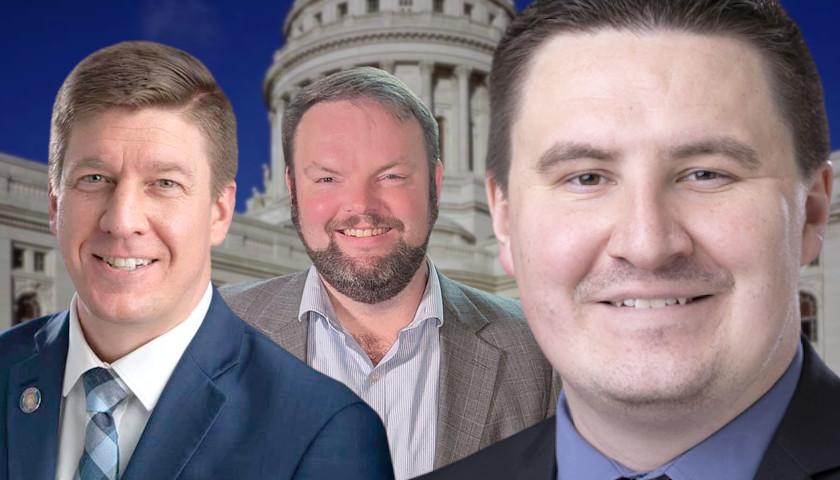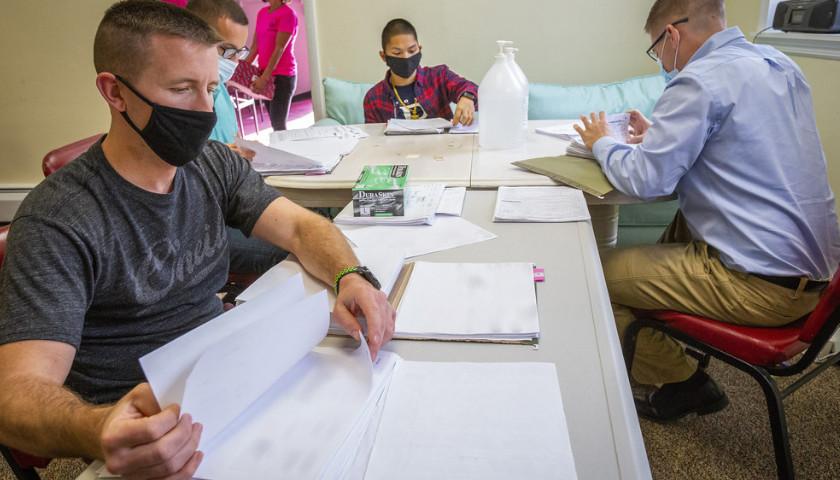Looking to get around Democrat Governor Tony Evers’ veto pen, Republican lawmakers have introduced the second consideration of a constitutional amendment to bar the use of private funds in election administration.
Passage would send the proposed amendment to referendum, letting voters — not the liberal governor — decide if controversial “Zuckerbucks”-like funding of elections is legal in Wisconsin.
The proposed amendment was introduced by State Senator Eric Wimberger (R-Green Bay) (pictured above, left) and Assembly co-authors, Representatives Tyler August (R-Lake Geneva) (pictured above, middle) and Ty Bodden (R-Hilbert) (pictured above, right).
A similar joint resolution passed in the Republican-controlled Assembly and Senate last February. Passage in two consecutive legislative sessions is required to place a proposed constitutional amendment on the ballot.
If the second consideration passes, the following questions will be on the April 2024 spring election:
· Shall section 7 (1) of article III of the constitution be created to provide that private donations and grants may not be applied for, accepted, expended, or used in connection with the conduct of any primary, election, or referendum?
· Shall section 7 (2) of article III of the constitution be created to provide that only election officials designated by law may perform tasks in the conduct of primaries, elections, and referendums?
“Every American should have confidence in how their elections are run. If localities can take private resources to directly administer elections, there will be a race to evade elections laws for control of cities in a battle for the state,” Wimberger said.
The floodgates of private — and partisan — funding of election administration opened in 2020 amid the opening months of the pandemic. That’s when Facebook founder Mark Zuckerberg and his wife, Priscilla Chan, donated more than $400 million for so-called “safe elections” grants. The brunt of the money was funneled through the Chicago-based Center for Tech and Civic Life (CTCL), a left-leaning nonprofit led by Tiana Epps-Johnson, who was part of the inaugural class of fellows at former President Barack Obama’s Obama Foundation. Epss-Johnson and her CTCL co-founders previously worked together at the New Organizing Institute (NOI), which was described by The Washington Post as “the Democratic Party’s Hogwarts for digital wizardry.”
Wisconsin’s five largest and Democrat-heavy cities received the lion’s share of the millions of dollars in CTCL funds distributed to Badger State local election offices.
CTCL worked with several liberal voting activist organizations. One activist, Michael Spitzer-Rubenstein, had been a long-time Democratic Party operative in New York. Spitzer-Rubenstein, according to records obtained through several open records requests, was embedded in the Green Bay Clerk’s office, where he offered to “cure” or correct absentee ballot information and was given access to the room where the absentee ballots were stored.
“But even the appearance of outside influence can erode public trust in the election process,” the Foundation for Government Accountability wrote in a report titled, ‘How Zuckerbucks Infiltrated the Wisconsin Election.’ “For example, email correspondence revealed that a current CTCL employee was a former policy advisor to Governor Evers. The CTCL employee offered to help the Eau Claire city clerk put together application materials, seeking to ensure the city would receive the maximum grant.”
Eau Claire, one of Wisconsin’s larger cities, is another Democrat stronghold. “Zuckerbucks” is what critics labeled the Zuckerberg-funded election administration grants that poured into the biggest Democrat-led cities in the 2020 battleground states of Arizona, Georgia, Michigan, Nevada, Pennsylvania, and Wisconsin. Those states narrowly delivered Democrat President Joe Biden the votes he needed to beat Republican President Donald Trump amid myriad election integrity questions and allegations. Trump had won the same states in 2016.
Wisconsin’s Republican-controlled legislature passed bills banning private funding in election administration. Not surprisingly, not a single Democrat voted for the bills. Also, not surprisingly, Evers’ vetoed the measures.
So, Republicans decided to go around the liberal governor through a constitutional amendment. Such resolutions require passage by both houses in two consecutive legislative sessions but do not require the governor’s approval. The second consideration is expected to easily pass a legislature dominated by Republicans.
Nearly half of the states (24) now have laws prohibiting, limiting, or regulating the use of private or philanthropic funding in elections administration, according to the National Conference of State Legislatures. All of the legislation has been enacted since the 2020 election.
“Partisan actors have no place in our election administration. They should not have access to absentee ballots or authority to direct how, where or when absentee ballots should be collected,” Wimberger said. “This proposed constitutional amendment would ensure that scenarios like what happened in the City of Green Bay in 2020 never happens again.”
– – –
M.D. Kittle is the National Political Editor for The Star News Network.
Photo “Tyler August” by Tyler August.





